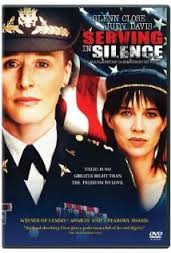
SERVING IN SILENCE: THE MARGUERITE CAMMEMEYER STORY
US, 1995, 100 minutes, Colour.
Glenn Close, Judy Davis, Jan Rubes.
Directed by Jeff Bleckner.
Serving in Silence: The Marguerite Cammemeyer Story is based on real characters and events. Marguerite Cammemeyer was a colonel in the American army, saw combat action in Vietnam, was a top ranking nurse. It emerged that she was lesbian and the army investigated her, ultimately demanding a court martial and trying her. However, her defence was so strong that even though she was dismissed from the army, she retained her decorations and the acclaim of the army. This happened in 1989. During the '90s there was an appeal, the army reconsidered her case and she was readmitted to the army in 1994.
This telemovie traces the later career of Grethe Cammemeyer, her relationship with an artist friend, Diane, the response of her father and her children and the pursuit of the case.
The film was nominated for Golden Globe and Emmy Awards and won them for Glenn Close in the central role. Judy Davis, as Diane, was also nominated for the awards. Jan Rubes portrays Grethe Cammemeyer's father.
The film was written by a woman but directed by a male, Jeff Bleckner.
The treatment is designed for the television audience, middle America. It is a rather more genteel and gentle approach to the subject, not demonstrative until the end of the film - making it watchable for people who may have homophobic prejudices. The film makes a clear appeal to the public to understand the homosexual orientation, to appreciate the potential for victimisation, the regulations imposed by such organisations as the army - which do not always mesh with the performance by homosexual military personnel.
1. Interesting and effective telemovie? Controversial topic? Treatment in writing and style for the average American public? World audiences?
2. The American settings, the army, Vietnam, Seattle? The settings of middle America with which audiences could identify?
3. The star performances, the executive production by Barbra Streisand and Glenn Close? Glenn Close and her prestige in the central role? Judy Davis and her performance? Making a lesbian relationship credible to the public?
4. The background of army regulations, the regulations against homosexuals and bisexuals serving in the military forces? The reality? The letter of the law? The court martial and the evidence, the tributes to Grethe Cammemeyer? The praise and her being allowed to retain her decorations despite her dismissal? The '90s and the reconsideration of regulations? The reinstatement?
5. The introduction to Grethe Cammemeyer, in action, her courage under fire, her work as a nurse? Her rank as colonel? Her promotions, her thesis, her acceptance amongst military personnel?
6. The background of her marriage, separation? Her four sons and her relationship with them? The background of her family? The scenes of domestic activities and love?
7. Grethe Cammemeyer's understanding of her sexual orientation? Her friendship with Diane? The growing understanding, falling in love, living together? The reticent way in which the telemovie presented this? Her decision to acknowledge her lesbianism? To the military authorities? To her father and writing the letter, visiting him and his reactions? Telling her sons - and the acceptance of three, the younger and his fears (perhaps of inheriting homosexuality)? The sympathy of her daughter-in-law?
8. The investigation by the army, the interrogation? Her telling her boss? The various personnel and their acceptance? The decision to pursue the court martial?
9. The character of Diane, her art background, a touch bohemian? The complementarity with Grethe? Their shared understandings, life together? Love? Diane taking her to see the lesbian group? The chaplain and her comments about being a lesbian and the church? Grethe and her reaction - that she was not like these lesbians? The legal adviser - and her later helping her in her court martial?
10. The preparation for the court martial? Getting ready, the help by her daughter-in-law - and her pregnancy? Her father and sons at the court? Diane? The role of the prosecution, the emphasis on the regulations? The defence and members of her family going to witness for her? Their waiting outside?
11. The delivery of the judgment? The effect on Grethe, the support of the family? Her press conference - and the elderly couple abusing her? The return home and her weeping? The support of Diane? The television news - and Diane's reaction, Grethe telling her to face reality, the phone call - and her mother's criticism about her hat?
12. The wedding sequence - her ex-husband not going near her, her not going into the church, being with her father and Diane? The response of her son and daughter-in-law, meeting the in-laws, the photo? The possibilities of breaking down prejudice?
13. Grethe Cammemeyer and her speaking publicly at homosexual campaigns? The speech about homosexual people being members of family, being doctors, being in the community and supportive?
14. The final sequence with Diane? Facing the future? Her vindication? The making of the telemovie and the significance of her life, case and witness to the cause of public acknowledgment of homosexuality and not victimising homosexuals?